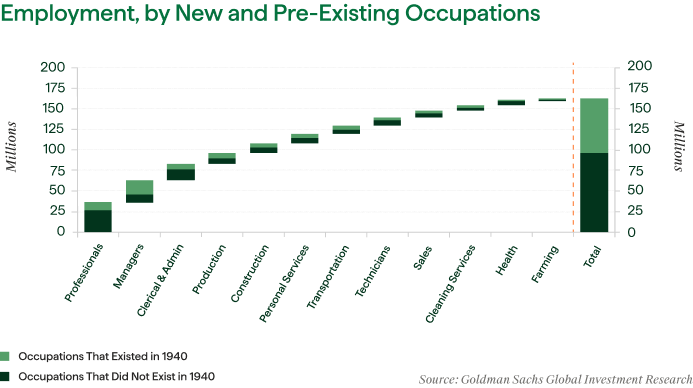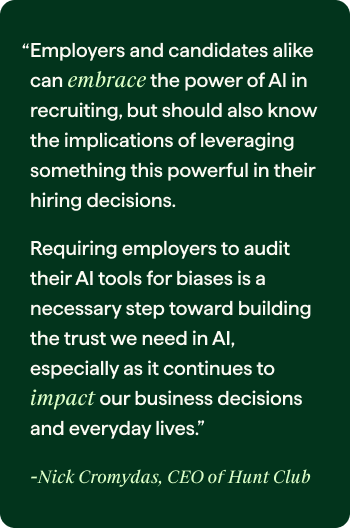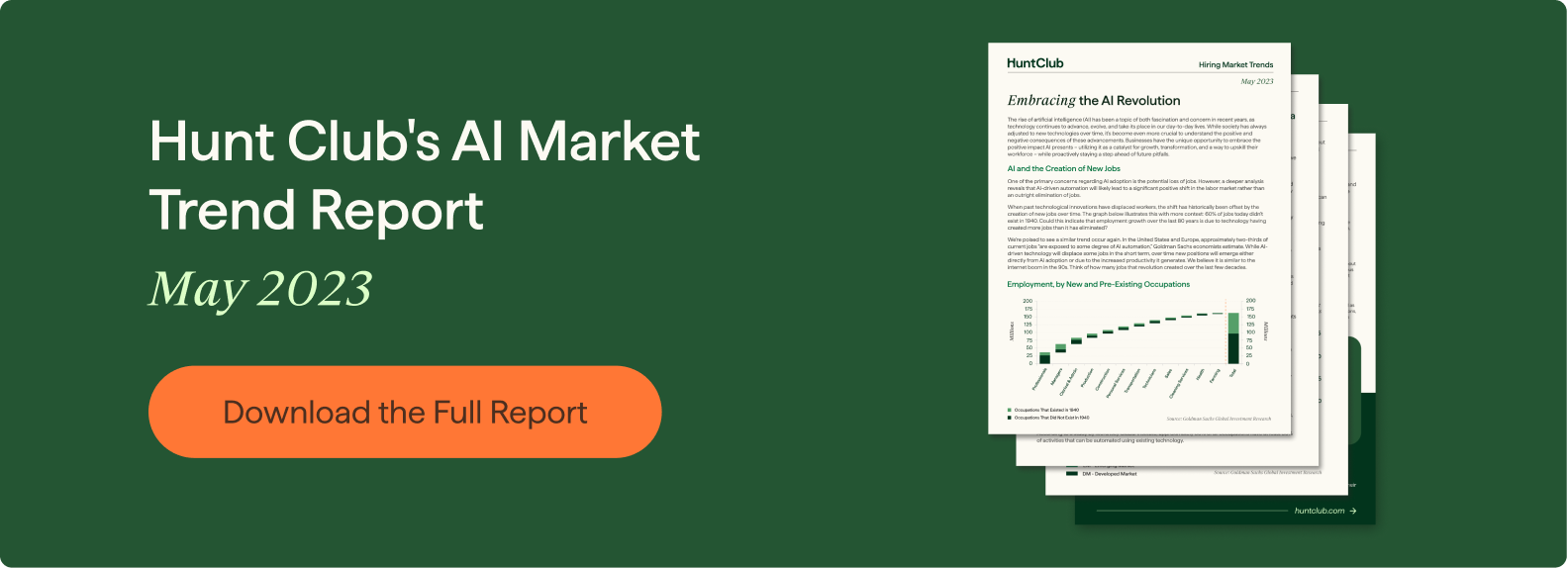According to Goldman Sachs economists, as many as 300 million full-time jobs around the world could be automated in some way by the use of new artificial intelligence (AI) technologies.
With this widespread integration of highly-advanced AI tools and platforms, many businesses, employees, and job seekers alike have begun wondering:
How will AI impact the talent market and the larger economy?
Will AI put jobs at stake? How many?
What are the limitations and ethical guardrails of using such a powerful tool at work?
Should we embrace the AI revolution? What will happen if we don’t?
While the conversation surrounding AI in the workplace yields many different perspectives, projections, and outlooks, one thing is for certain: AI is here, and it’s changing the way humans work forever.
The Question On Everyone’s Mind: How Will AI Impact Our Jobs?
According to a study by McKinsey Global Institute, approximately 60% of all occupations have at least 30% of activities that can be automated using existing technology.
Whether an AI tool performs basic data entry or a machine drops off drinks at a table in a restaurant, many of us have asked the question: How will AI affect our daily work and jobs?
To answer this question, we look to past technological innovations that have displaced workers, and how, ultimately, the shift has historically been offset by the creation of new jobs over time.
The graph below illustrates this with more context. Consider, for instance, the fact that 60% of jobs today didn't exist in 1940.

Could this indicate that employment growth over the last 80 years is due to technology having created more jobs than it has eliminated? Could it be that AI-driven automation will likely lead to a positive shift in the labor market, rather than an outright elimination of jobs?
Only three decades ago, we experienced something similar with the Internet boom in the 90s. While once concerned about what it could mean for our jobs, we now know and have seen incredible innovations, booming markets, and unprecedented job creation come from the Internet revolution.
Humans Will Increasingly Rely on AI… But Does AI Rely on Humans?
To drive business outcomes at scale and grow at a steady pace, we often rely on AI-driven mechanisms. Parts of our day-to-day work are made easier, faster, or more efficient with the help of AI-driven tools, and for many, AI tools actually power the work we do.
In other words? Many humans now need some form of AI-driven tech to perform their jobs at the rate, quality, and scale today’s economy and overall workforce require.
But in the same way humans need AI, perhaps AI needs humans to exist.
With the increasingly prolific use of AI in our work, it may be that we are ultimately creating new jobs as a direct result of AI use and adoption.
This concept is widely reflected in the United States and Europe, where approximately two-thirds of current jobs “are exposed to some degree of AI automation,” Goldman Sachs economists estimate. And while AI may displace some jobs in the short term, new positions will likely emerge over time either directly from AI adoption or due to the increased productivity it generates.
As AI adoption becomes more prominent, here are just a few examples of jobs Hunt Club has begun to see growth-stage companies and enterprise organizations alike start to hire for:
- AI/ML (Machine Learning) Engineers
- AI-Focused Data Scientists
- AI Ethics Officers
- AI Trainers
- AI Business Strategists
- AI Sales Specialists
- AI User Experience (UX) Designers
AI’s Role In Sourcing and Recruiting Talent
So how does AI affect the actual talent market?
As new jobs are created in direct response to AI, these new roles will inevitably require new conditions and qualifications for the people who will fill them. AI-based roles will require nuanced skill sets, new certifications, or perhaps even new academic degrees that didn’t previously exist.
When evaluated all together, AI has the potential to yield an even more skilled and prosperous workforce and can contribute to employment growth in the long run.
And how will AI influence the recruitment process itself? Who (or what) shall be responsible for identifying and sourcing such nuanced talent? Will AI have a role in this, too?
While automation can help in the screening and recruitment process, it’s ultimately humans that can identify, relate to, and connect with other humans. As AI systems complete mundane, repetitive tasks, talent acquisition specialists will be free to focus on more creative, genuine, and interpersonal aspects of their work.

“AI can be incredibly useful in many parts of the hiring process — for instance, to ingest tens of thousands of candidates across the world or to measure the strength of a referral, but solely relying on AI to assess the depth of a human being and a candidate’s potential? That’s a fool’s errand.”
There is an undeniable value for the use of AI in recruitment — our own Hunt Club platform is built on the power of combining AI-driven technology and community and has proven to be successful in connecting companies with the right talent. This won’t change. People identify good people. AI can help, but it won’t replace relationships, and only humans can assess and build these relationships. “
- Nick Cromydas, CEO of Hunt Club
Ethical AI Use in Talent Acquisition
 While society has always adjusted to and prospered with new technologies over time, it's become even more crucial to understand the positive and negative consequences of such powerful tools and advancements.
While society has always adjusted to and prospered with new technologies over time, it's become even more crucial to understand the positive and negative consequences of such powerful tools and advancements.
While automated sourcing and other AI-driven recruiting tools can help improve certain hiring metrics, organize large data sets, conduct outreach, and complete other repetitive tasks, we must understand their limitations when it comes to identifying potential and following fair hiring practices.
AI-based recruiting tools should be created and monitored regularly to eliminate biases, discrimination, and other prejudices that prevent fair and equitable hiring practices.
“Employers and candidates alike can embrace the power of AI in recruiting, but should also know the implications of leveraging something this powerful in their hiring decisions.
Requiring employers to audit their AI tools for biases is a necessary step toward building the trust we need in AI, especially as it continues to impact our business decisions and everyday lives.”
- Nick Cromydas, CEO of Hunt Club
Hunt Club, a Human-Driven and AI Technology-Powered Search Firm
At Hunt Club, we’ve reimagined recruiting for a new age, leveraging AI technology to scale faster and farther than legacy models.
Our AI-powered Search Platform automates as much of the recruiting process as possible, such as manual funnel management, candidate sourcing, scheduling, and more, so our recruiters can spend more time on what truly matters — cultivating deep, personalized relationships with clients and candidates to ensure the very best fit and experience.
The integration of AI into the workforce is not about replacing human labor, but rather about creating an environment where humans and AI systems can work together to achieve common goals.
By combining uniquely human skills with AI's powerful capabilities, businesses can drive innovation and accelerate growth at an unprecedented rate.
As for us, we’re in an industry that deals so intimately with humans and their livelihoods, so it remains paramount to lead (and end) with this: People identify good people.
And with a little help from AI, we stand to do even more extraordinary things.








